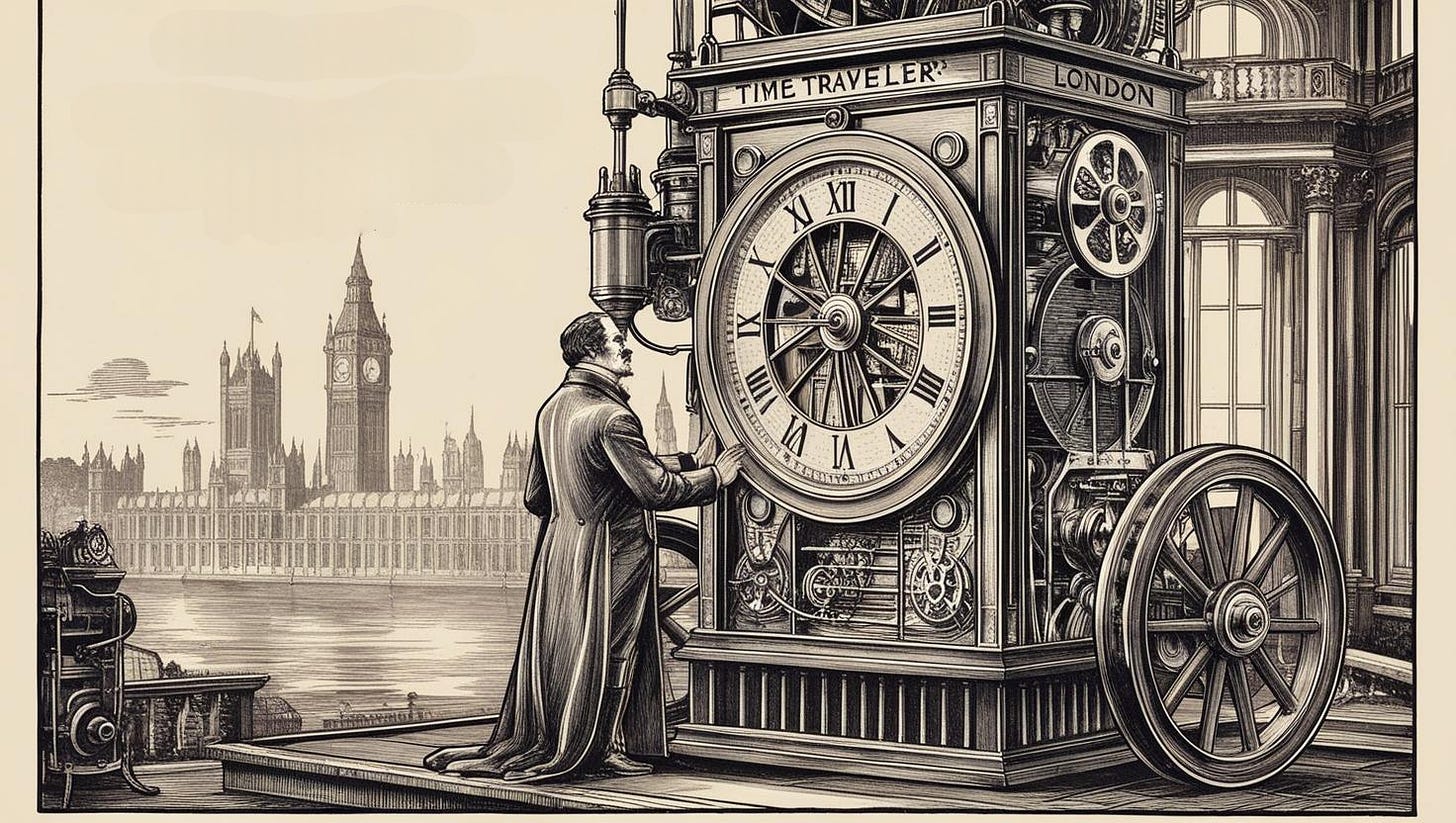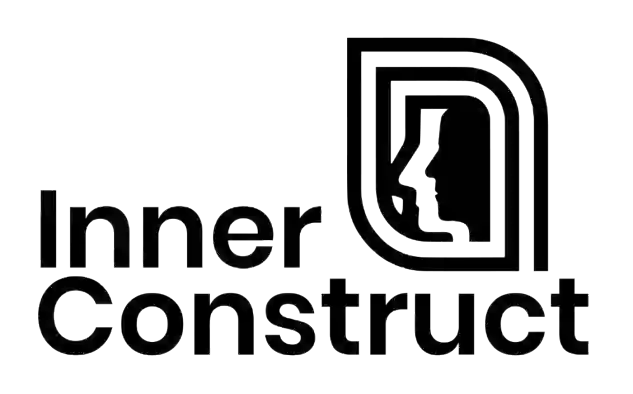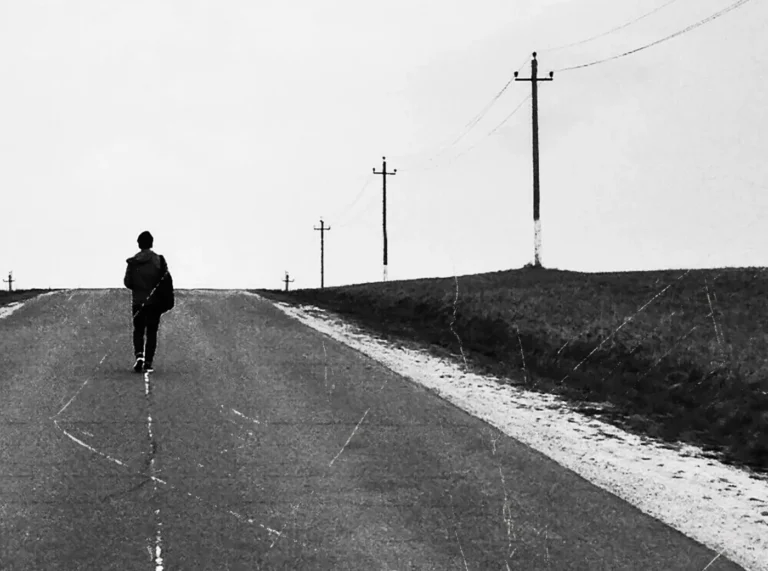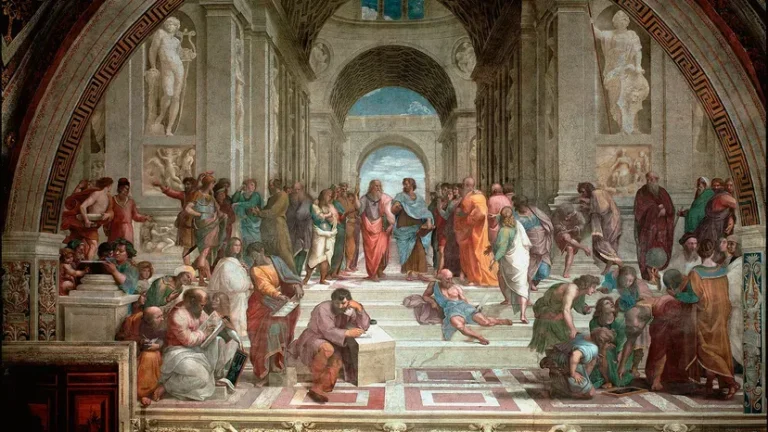Reflections from H.G Wells’ Time Machine

Introduction
In an age where technology accelerates and human values shift, a persistent existential question echoes: where are we heading?
Between the pages of The Time Machine by H.G. Wells, we find more than just a fantastical tale of a machine piercing through time. The novel holds up a mirror to a possible destiny—one hidden beneath the routines of modern life, behind our screens, and within the quiet of smart cities.
In a world where “comfort” has become the highest ideal, are we aware of the human cost we might eventually pay? And is technological advancement inherently a form of human progress?
This article isn’t a conventional reading of a classic novel. It’s a journey through its philosophical, scientific, and social layers—drawing from them sharp questions about the fate of civilizations, the essence of humanity when needs disappear, motivations fade, and emotions flicker out.
So let us board the time machine… not to escape the present, but to understand it through the eyes of one who saw the future.
About the Author: H.G. Wells
Herbert George Wells (1866–1946) was a British writer and thinker, regarded as one of the pioneers of modern science fiction. He was known for blending speculative fiction with deep philosophical and social commentary, in works such as The Time Machine, The War of the Worlds, and The Invisible Man.
Wells was more than a storyteller—he was a sharp critic of society. Through his fiction, he foresaw issues like class division, human evolution, the fate of civilizations, and the ethical implications of technology.
He was inspired by Darwin’s theory of evolution and the class dynamics of Victorian England. Through The Time Machine, he imagined where humanity might be heading if social division and unbalanced technological reliance continued unchecked.
Time as the Fourth Dimension — The Scientific Backdrop of Time Travel
Wells didn’t treat time merely as a dramatic tool but approached it with a visionary scientific boldness. While classical physics considered time to be fixed and absolute, ideas like time as a fourth dimension challenged this assumption.
In the late 19th century, thinkers such as Simon Newcomb and Charles Hinton were already toying with the notion of time as a measurable extension, like length or height. Though radical then, these thoughts laid the groundwork for what would later become Einstein’s theory of relativity.
Key scientific ideas of that era:
Newtonian View: Time is absolute, constant everywhere, and beyond human manipulation.
Early Alternative Views:
Charles Hinton published the idea of a “four-dimensional space” in 1880, imagining beings inhabiting different dimensions.
Newcomb explored the geometry of time, proposing the idea of “temporal architecture.”
While these ideas weren’t yet scientifically proven, they inspired both science fiction writers and philosophers.
Decades before Einstein’s Special Relativity in 1905, Wells dared to imagine time travel as a concept that could be approached scientifically. Einstein would later demonstrate that time is relative—it slows down for an observer moving near the speed of light—thus giving time travel a real theoretical basis.
Section I: Social Class — When Humanity Splits
Historical Context: Class in 19th-Century England
During the height of the Industrial Revolution, England saw an increasing divide between the working class, laboring in factories and mines, and the upper class, enjoying leisure, education, and influence.
Wells, born into a working-class family, experienced this divide firsthand. Through his novel, he posed a philosophical warning:
“What if this gap persisted for thousands of years? What would humanity look like then?”
In The Time Machine, Wells imagines a dystopian future not marked by war or disaster, but by a quiet, insidious divide within humanity itself—an evolutionary consequence of extreme social stratification.
The privileged evolve into the Eloi: gentle, frail, intellectually shallow beings who live in comfort above ground. Meanwhile, the working class becomes the Morlocks: pale, near-blind creatures who toil underground to maintain the systems and feed the Eloi—not out of kindness, but as part of a horrifying cycle of predation.
The novel shows the Morlocks as victims too. They live in constant fear, even of each other. Cannibalism becomes a survival mechanism in a world stripped of other life forms—turning both classes into shadows of human potential, trapped in a meaningless existence.
What led to this descent?
Excessive Comfort Weakens Humanity
When comfort becomes permanent rather than a respite, it dulls the human edge. Skills—mental and physical—atrophy. The Eloi become light, passive, and purposeless.
Loss of Physical Labor
Without effort, achievement loses meaning. The link between cause and effect breaks down, creating a void between being and doing.
Though the Eloi live on the surface, they are subconsciously ruled by the Morlocks who run the infrastructure. This flips the power dynamic: is authority visible, or hidden? Is silent submission the new form of collective surrender?
Section II: Technology and Progress — Are We Evolving… or Withering From Within?
Although the story leaps thousands of years into the future, humanity seems not wiser, but hollow. Technological advancement empties human life of meaning—people no longer live with purpose but drift in unconscious comfort or mechanical labor.
In the Eloi world, everything is available—food, shelter, safety—yet there’s no thought, creativity, or meaning. Complete ease led to the extinction of need, then the extinction of ambition. The human being is reduced to a shadow of its former self.
In contrast, the Morlocks, though technologically adept, become predatory and morally bankrupt.
Over millennia, overreliance on technology deteriorated the human brain. Language was reduced to simple, primal words—food, water, fear—rendering complex thought and communication obsolete.
Wells suggests this degeneration was gradual, not abrupt. It compels us to ask: is our current dependence on technology a slow descent into the same fate?
Modern parallels include:
AI and Algorithms:
Technology now thinks for us—recommendations, smart devices, generative AI. It eases life but may weaken memory, focus, and personal initiative.
Automation and the Erasure of Labor:
As machines replace work, effort becomes obsolete. This sparks existential questions: If we no longer need to strive, do we lose the value of effort itself?
Perpetual Entertainment and Emotional Isolation:
Endless streaming, social media, and gaming create addictive worlds. Like the Eloi dancing in sunlight without knowing why—we might be living comfortably but shallowly, interacting without depth.
Section III: Humanity, Nature, and the Cosmos — When Need Ends, Does Humanity End Too?
In The Time Machine, humans are no longer threatened by nature—but they have also lost connection to it. Nature becomes a passive backdrop, and human life drifts purposelessly within it.
Wells shows that the absence of struggle leads to the dimming of emotion, the decline of art, and the withdrawal of humans from evolution. So is need essential for life to pulse? And does progress make us less human?
Emotions like jealousy, motherhood, and passion fade. Even art survives only as meaningless ritual—dancing and flower-adornment stripped of symbolic power.
Wells raises a critical question:
Does material progress mean human progress… or the end of meaning?
Human Growth Is Born from Struggle
Strength, intelligence, and virtues like patience and cooperation emerge from adversity. Without danger, as in the Eloi world, these wither.
Emotion Is Rooted in Survival
Many human feelings are tied to the instinct for protection. When the need disappears, so does the emotional intensity.
Man’s Place in the Universe
In a haunting scene, the narrator reaches the distant future where Earth is a cold, lifeless sphere—no civilization, language, or even time. It prompts a bitter question: Does anything we build have meaning, if we are but fleeting sparks in an indifferent cosmos?
From an ecological lens, this may be an early condemnation of industrial excess and environmental neglect. From a cosmic view, however, the end is inevitable—our sun will die. Earth will perish. Perhaps we are not guilty… just witnesses to a vast, impersonal universe.
Between human error and cosmic inevitability, Wells leaves us wondering: Are we ending the world—or is the end written in the stars?
Section IV: Fear and Kindness — When Emotions Become Habits
In the Eloi world, emotions exist on the surface but lack depth. They appear kind but don’t feel danger. No one acts to save others. The narrator’s relationship with Weena stands out as a rare, genuine bond in a numb society.
Meanwhile, the Morlocks live in constant fear—of light, of others, of themselves.
This contrast—dead kindness vs. primal fear—raises a deeper question:
Are we human because we feel… or because we understand why we feel?
When Weena nearly drowns, no Eloi helps. They merely watch, unmoved. Their “kindness” isn’t linked to responsibility—it’s a social shell with no core.
Only after the narrator saves Weena does a real emotional connection emerge. Her attachment and fear of losing him suggest remnants of true emotion—but ones triggered only by external shock.
Section VI: Silence Before Truth — When the Time Traveler Returns, but No One Asks
One of the novel’s most jarring scenes: the time traveler returns from the future… and is met with silence. No questions. No debates. Just indifference.
This silence isn’t a void, but a collective decision to ignore uncomfortable truth.Sometimes indifference hurts more than denial.
The traveler’s pain isn’t in witnessing the future—it’s in trying to share it with people who refuse to see.
When you return from a painful journey—through time, or through life—and you share what you’ve seen, only to be met with cold silence…
…it’s as if you never went, never saw, never existed.
Silence here isn’t noble—it’s one of the sharpest forms of psychological defense:
Because the truth is too big to grasp
Because hearing it would force us to act
Because words feel useless in the face of fate
Section VII: The Disappearance of the Time Traveler
After recounting his journey, the time traveler vanishes. No explanation. No closure. But the silence speaks volumes:
Did he return to the future in search of meaning?
Did he escape a present that wouldn’t listen?
Or does truth ultimately exile those who speak it?
Perhaps those who see too far ahead are silenced—not because they’re wrong, but because they’re early. History has punished many who were simply ahead of their time.
Possible reasons for his disappearance:
1. He returned to the future — seeking truth where silence reigns, away from a world deaf to meaning.
2. He was trapped in time — a broken device, a temporal dead-end, a closed loop.
3. He chose not to return — finding no faith in a world that prefers comfort to truth.
4. He went to the past… or died in error — rejected, misunderstood, or erased.
Time does not forgive. It isn’t linear—it’s a minefield for the unaware.
Section VIII: Recurring Fates — When “The Time Machine” Echoes Through History
Wells’ vision isn’t confined to fiction. Many real civilizations followed the same pattern: rising to luxury and knowledge, then silently collapsing from within.
Rome: From discipline to decadence to decay. Its military and civic glory gave way to elite indulgence and societal apathy.
Maya: Advanced astronomy and mathematics—but excessive rituals and unsustainable practices led to their sudden collapse.
Babylon: Architectural and legal brilliance masked internal power struggles and inequality. Its grandeur hid spiritual imbalance.
Edo Japan: Centuries of cultural refinement and isolation, but its rigidity eventually crumbled with foreign pressure. Balance without renewal proved fragile.
In each case, outer strength masked inner erosion.
Conclusion
The Time Machine is not just a fantasy—it’s a literary prophecy.
It asks:
What if civilizations continue this way?
What if humans split not only socially… but biologically?
Wells doesn’t attack science or comfort—he warns against imbalance. He doesn’t reject progress—he calls for progress with purpose. In the world of the Eloi, emotions weren’t needed—so they vanished. Emotions are not inherited. They must be summoned by necessity. And today, in a fast, convenient, hyperconnected world—do we have the courage to resist quiet numbness?
Perhaps we don’t need a time machine…
Just a moment of truth with ourselves.
To reclaim our awareness… and redefine progress—before it redefines us.




